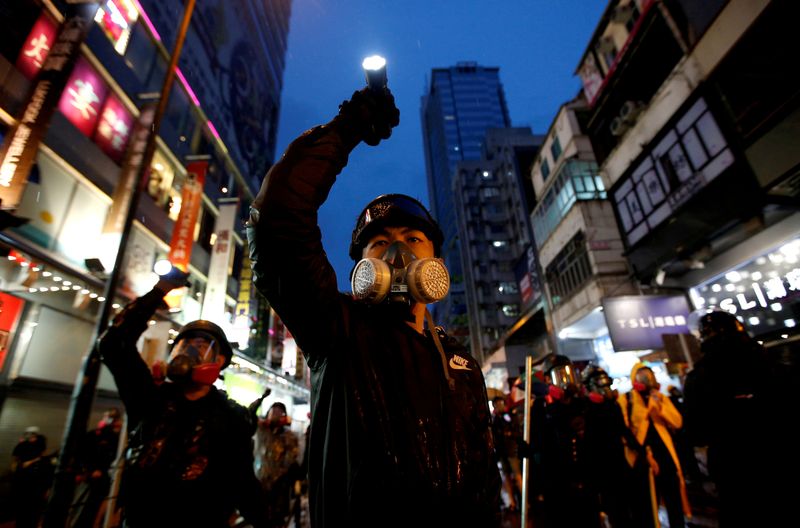
FILE PHOTO: Demonstrators protesting the proposed extradition bill aim their flashlights towards riot police as they are chased through the streets of Hong Kong, China, August 25, 2019. REUTERS/Willy Kurniawan/File Photo
May 21, 2020
By James Pomfret and Yew Lun Tian
HONG KONG/BEIJING (Reuters) – China is set to impose new national security legislation on Hong Kong after last year’s often violent pro-democracy unrest that plunged the city into its deepest turmoil since it returned to Beijing rule in 1997, a Chinese official said on Thursday.
The statement confirmed what three people with direct knowledge of the matter told Reuters, potentially sparking fresh anti-China protests in the freewheeling former British colony, which enjoys many freedoms not allowed on the mainland.
Pro-democracy demonstrators have for years strongly opposed the idea of national security laws, arguing they could erode the city’s high degree of autonomy, guaranteed under the “one country, two systems” formula put in place when it returned to Chinese rule.
“In light of the new circumstances and need, the National People’s Congress (NPC) is exercising its constitutional power” to establish a new legal framework and enforcement mechanism to safeguard national security in Hong Kong, Zhang Yesui, the spokesman for the legislature, said.
He was speaking at a late night briefing on the eve of the start of China’s annual parliamentary session. Further details would be given on Friday, he added.
Hong Kong media outlets reported that the legislation would ban secession, foreign interference, terrorism and all seditious activities aimed at toppling the central government and any external interference in the financial hub.
The legislation, which will be deliberated by the NPC, could be a turning point for its freest and most international city, potentially triggering a revision of its special status in Washington and likely to spark more unrest.
Online posts had already emerged urging people to gather to protest on Thursday night and dozens were seen shouting pro-democracy slogans in a shopping mall as riot police stood nearby.
Opposition democrats said the move would gravely wound Hong Kong’s reputation as a financial centre and its high degree of autonomy.
“If this move takes place, ‘one country, two systems’ will be officially erased,” said democratic lawmaker Dennis Kwok.
“This is the end of Hong Kong,” added Kwok, flanked by other opposition democrats.
Hong Kong people took to the streets last year to protest a now-withdrawn bill that would have allowed extraditions of criminal suspects to mainland China. The movement broadened to include demands for broader democracy amid perceptions that Beijing was tightening its grip over the city.
“If Beijing passes the law … how (far) will civil society resist repressive laws? How much impact will it unleash on to Hong Kong as an international financial centre?” said Ming Sing, political scientist at the Hong Kong University of Science and Technology.
The Hong Kong dollar weakened on the news.
A senior Hong Kong government official said technical details of the move and how it would be implemented remained unclear.
The NPC begins its annual session on Friday after being delayed for months by the coronavirus.
U.S. Secretary of State Mike Pompeo said on May 6 he was delaying the report assessing whether Hong Kong was sufficiently autonomous to warrant Washington’s special economic treatment that has helped it remain a world financial centre.
The delay was to account for any actions at the NPC, he said.
Tension between the two superpowers has heightened in recent weeks, as they exchanged accusations on the handling of the coronavirus pandemic, souring an already worsening relationship over trade.
BYPASS MECHANISM
A previous attempt by Hong Kong to introduce national security legislation, known as Article 23, in 2003 was met with mass peaceful protests and shelved.
Hong Kong has a constitutional obligation to enact Article 23 “on its own”, but similar laws can be introduced by Beijing separately into an annex of the Basic Law, the city’s mini-constitution.
That legal mechanism could bypass the city’s legislature as the laws could be imposed by promulgation by Hong Kong’s pro-Beijing government.
“Some people are destroying Hong Kong’s peace and stability. Beijing saw all that has happened,” pro-establishment lawmaker Christopher Cheung, who is not part of discussions in Beijing, told Reuters.
“Legislation is necessary and the sooner the better.”
Protesters denounce what they see as the creeping meddling in Hong Kong by China’s Communist Party rulers. Beijing denies the charge and blames the West, especially the United States and Britain, for stirring up trouble.
(Additional reporting by Greg Torode, Clare Jim, Sarah Wu and Jessie Pang; writing by Marius Zaharia; Editing by Toby Chopra and Nick Macfie)

